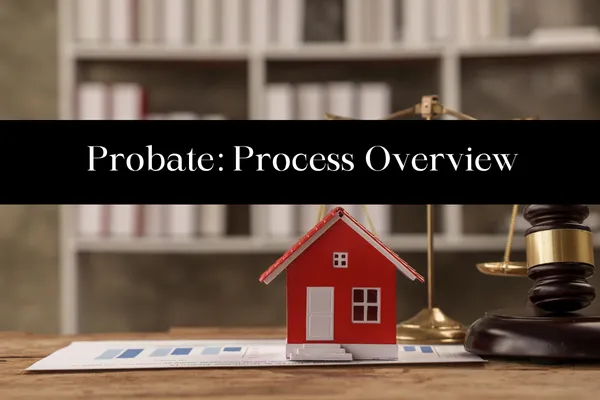
Understanding the Probate Process in Pennsylvania
How the Probate Process Works in Pennsylvania
Every estate is unique, but the general process follows the same path. Here’s what typically happens:
Step 1: Locate the Will and Gather Documents
If there’s a will, locate the original and make sure it hasn’t been altered. You’ll also need several certified copies of the death certificate.
It’s also helpful to gather paperwork like bank statements, investment records, deeds, vehicle titles, and any outstanding bills. Staying organized now will save time later.
Step 2: Decide Whether You Want to Hire a Probate Attorney
You are not required to hire an attorney to handle probate. Many executors and administrators choose to work with one because the process includes legal filings, deadlines, and forms that can feel overwhelming. But if the estate is straightforward, you absolutely can handle the process yourself.
If you do decide to work with an attorney, they can review the will, and prepare the paperwork needed to open probate with the court. They can also explain any tax responsibilities you may have under Pennsylvania law.
Step 3: File with the Register of Wills
To open probate, you’ll file the will and the death certificate with the Register of Wills in the county where your loved one lived, typically Philadelphia or Bucks County. You can do this on your own or with an attorney if you prefer.
Once the filing is approved, the court will issue Letters Testamentary (if there is a will) or Letters of Administration (if there isn’t). These documents officially give you the authority to manage the estate — including paying bills, handling accounts, and selling property.
Step 4: Notify Heirs and Creditors
After you’re appointed, notices are sent to all heirs listed in the will, and a legal notice is published in a local newspaper to inform creditors.
Creditors have a limited period to make claims. During this time, the executor or administrator can’t distribute assets until all valid debts are confirmed and paid.
Step 5: Inventory the Estate and Open an Estate Account
Next, you’ll create an inventory, a full list of everything the deceased owned. This includes real estate, vehicles, bank accounts, investments, and personal property.
An estate bank account should be opened to manage funds. Any payments made or received must go through this account to keep a clear record for the court.
Step 6: Handle Real Estate Decisions
For many families, the most emotional and valuable part of an estate is the home. Deciding what to do with it, sell, rent, or keep, can feel complicated.
This is often when families reach out to me. As a probate real estate specialist, I help executors understand:
What the home is worth AS-IS
Which small repairs or updates could increase value
How to market the property while meeting probate requirements
The goal is to help you protect the estate’s value and meet your legal responsibilities without adding more stress to an already emotional time.
Step 7: Pay Debts and Taxes
Once you’ve confirmed the estate’s debts, the next step is to pay them. This includes final bills, credit cards, or medical expenses, along with any state or federal taxes due.
Pennsylvania requires the Inheritance Tax Return (REV-1500) to be filed within nine months of death, but paying it within three months can earn a small 5% discount.
Your attorney will guide you through this step and ensure all filings are accurate.
Step 8: Distribute Assets and Close the Estate
After debts and taxes are paid, the remaining assets can be distributed to the heirs or beneficiaries.
Once this is complete, the estate can be formally closed. The attorney files a final accounting with the court, confirming that all responsibilities were handled properly.
County Resources
For reference, here are the local offices where probate filings begin:
Philadelphia County Register of Wills
City Hall, Room 180, Philadelphia, PA
https://secure.phila.gov/willsBucks County Register of Wills
55 East Court Street, Doylestown, PA
https://buckscounty.gov/413/Register-of-Wills
Each county follows the same general process but may have slightly different forms or filing fees. Always confirm the latest details before visiting.
When to Call a Professional
You don’t need to do this alone.
If you’re dealing with court filings or tax questions, your probate attorney is your best resource.
If the estate includes real estate, that’s where I can help; by reviewing the property’s value, coordinating clean-outs or repairs, and handling the sale process with care and transparency.
Having professionals by your side saves time, prevents costly mistakes, and gives you peace of mind that every part of the estate is being handled correctly.
Request a Free Probate Home Value Report
If you’re managing an estate that includes a home in Philadelphia or Bucks County, I offer a free, no-obligation review.
You’ll receive:
The home’s current AS-IS market value
Suggestions for small updates that could raise its value
A realistic price range if you choose to sell
📞 Call (215) 261-5567 or schedule a time to connect with me
This small step can help you make informed decisions that protect your loved one’s legacy.
A Final Word
Probate can feel like a maze, but once you understand the steps, the path becomes much clearer.
Move at your own pace. Ask every question you need to. And lean on professionals who will guide you with patience, clarity, and respect for your family’s situation.
If you ever need support on the real estate side of probate, whether it’s understanding timelines, preparing a property for sale, or weighing your options, I’m here to make that part of the process easier.


